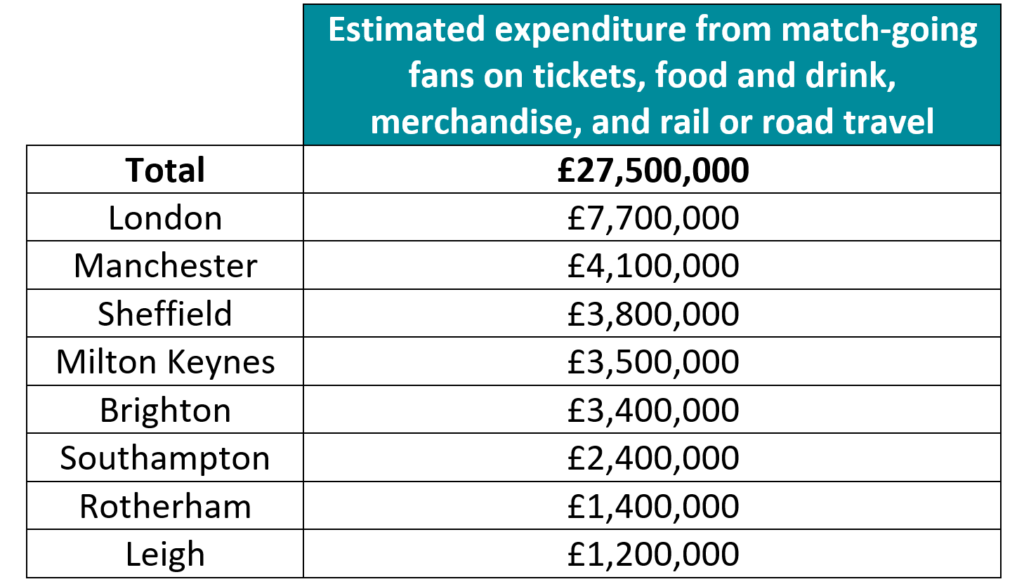This weekend brings the final of the Women’s Euro 2022 tournament, as England face Germany. After the men’s team finished just short in last year’s European Championships, this marks a second major final in as many summers for England’s representatives. Success has not only been limited to the pitch, however, with hosting the tournament generating significant economic activity.
Attendance figures have shown the growing popularity of the women’s game. The tournament has seen an estimated 575,000 spectators, far surpassing the previous record of 240,000, set in 2017. Though the cost of attending women’s football is not as high as with men, Cebr estimates that these supporters have collectively spent £27.5 million on match-related consumption across the 31 games in this year’s tournament. This equates to approximately £48 per supporter per game, covering match tickets, food and drink, merchandise, and rail or road travel.1
This expenditure has been relatively evenly spread across the country, with four of the host cities being in the North and four in the South. London, which has hosted more games than any other city, has seen the highest level of consumption from match-attending supporters, amounting to £7.7 million. Manchester has seen the next highest level of expenditure, generating £4.1 million of match-related consumption across its four games. At the other end of the scale, Rotherham and Leigh have seen match-going consumption of £1.4 million and £1.2 million, respectively. Though these values are lower than the major cities, they represent much larger shares of the local economies.

Consumption has not just been limited to match attendees, however. According to survey data from YouGov, 30% of British adults stated that they would watch at least some of the tournament. Of these, 4% stated that they would be watching the games in hospitality venues. Based on these figures, and the average hospitality expenditure when watching a sporting fixture, we estimate that football fans have spent approximately £124 million in hospitality venues while watching this summer’s tournament. Within this figure, £12.2 million of hospitality expenditure is expected to take place during this Sunday’s final alone. The preferences of the host nation are clear, however, with expenditure being heavily concentrated during England games. Despite participating in less than a fifth of the tournament’s matches, expenditure during England games has accounted for an estimated 59.0% of the total.
Combining the figures for match attendees and those watching in hospitality venues, we estimate that the Women’s Euro tournament has directly supported £152 million of expenditure. Consumption is of course just one of the benefits of hosting major sporting events, with further impacts including wider effects on GVA and the potential longer-term impact of increased sporting participation.
1 Other expenditure sources, such as overnight stays and international travel are not included in these figures. As such, the true consumption impact is likely to be higher.
For more information please contact:
Sam Miley, Senior Economist Email smiley@cebr.com Phone 020 7324 2874
Cebr is an independent London-based economic consultancy specialising in economic impact assessment, macroeconomic forecasting and thought leadership. For more information on this report, or if you are interested in commissioning research with Cebr, please contact us using our enquiries page.
